#learn czech
Text
Food vocab - czech, spanish, english
(langblr reactivation challenge day 4)
czech - spanish - english
brambory - patatas - potatoes
brokolice - brócoli - broccoli
celer - apio - celery
cibule - cebolla - onion
česnek - ajo - garlic
čočka - lentejas - lentils
fazole - frijoles - beans
houba - seta - mushroom
hrášek - guisantes - peas
chřest - espárragos - asparagus
kapusta - repollo - cabbage
kukuřice - maíz - corn
květák - coliflor - cauliflower
lilek, baklažán - berenjena - eggplant
mrkev - zanahoria - carrot
okurka - pepino - cucumber
paprika - pimiento - bell pepper
petržel - perejil - parsley
pórek - puerro - leek
špenát - espinaca - spinach
ananas - piña - pineapple
banán - plátano - banana
švestka - ciruela - plum
meruňka - albaricoque - apricot
broskev - melocotón - peach
citron - limón - lemon
hrozny - uvas - grapes
jahoda - fresa - strawberry
borůvka - arándano - blueberry
malina - frambuesa - raspberry
ostružina - mora - blackberry
rybíz - grosella - currant
vodní meloun - sandía - watermelon
meloun - melón - melon
pomeranč - naranja - orange
mandarinka - mandarina - mandarin
třešeň - cereza - cherry
mléko - leche - milk
sýr - queso - cheese
smetana - nata - cream
šlehačka - nata montada - whipped cream
jogurt - yogur - yogurt
máslo - mantequilla - butter
mouka - harina - flour
med - miel - honey
rýže - arroz - rice
těstoviny - pasta - pasta
olej - aceite - oil
ocet - vinagre - vinegar
hořčice - mostaza - mustard
#vocab list#vocab lists#spanish vocabulary#spanish#czech vocab#czech vocabulary#czech#spanish vocab#spanish langblr#czech langblr#food vocabulary#food vocab#langblr#learn czech#learn spanish#learning czech#learning spanish
285 notes
·
View notes
Photo
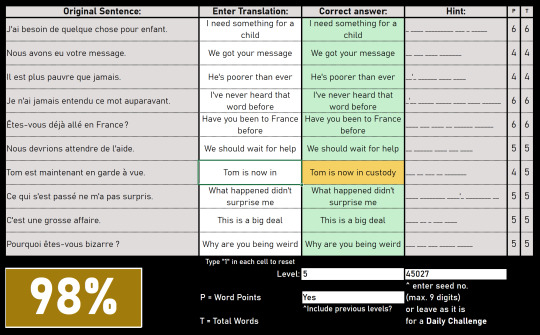
You can now learn languages with LangGuessr! Pick your level from 1 to 20, from the most common to the most obscure words, translate the words you know and memorise the ones you don't.
This is a learning method I developed to work best for myself, if it works for any of you then all the better!
List of languages currently available (more coming soon!):
- Bosnian
- Bulgarian
- Catalan
- Croatian
- Czech
- Dutch
- Esperanto
- Finnish
- French
- Galician
- Georgian
- German
- Greek
- Hebrew
- Hungarian
- Italian
- Kabyle (Berber)
- Latin
- Lithuanian
- Mandarin
- Polish
- Portuguese
- Romanian
- Russian
- Serbian
- Spanish
- Swedish
- Turkish
- Ukrainian
- Yiddish
#learn bosnian#learn bulgarian#learn catalan#learn croatian#learn czech#learn finnish#learn galician#learn georgian#learn greek#learn hebrew#learn hungarian#learn kabyle#learn lithuanian#learn polish#learn romanian#learn russian#learn serbian#learn swedish#learn ukrainian#learn yiddish
88 notes
·
View notes
Text
What is this? [Lesson #2]
In this lesson you’re going to learn how to ask the question “What is this?” and responses you can give to this question.
What is this? What is that?
Co je to? - What is this?
Co je tamto? - What is that?
In Czech language it is possible to translate the sentence exactly as it is in English. Meaning:
Co - What
Je - is (3rd person, singular)
To - this
Tamto - that
If you are asking the question and pointing at more than one thing, you ask the same way! That means that if you want to say “What are those?”you are still going to say Co je tamto?
It must sound a bit weird but believe me, it is natural in Czech.
As you will find out in the next lessons, in Czech we use conjugations and declensions to determine whether the noun is a subject or subject and to whom the verb points to. Therefore it is possible, in some cases, to change the structure of the sentence (usually to emphasize a specific detail). It can happen you’ll encounter very often Co to je? which is the same as Co je to?
Remember though, that in most cases the sentence structure is SVO (subject-verb-object) as in English.
This is.../That is...
This is where things get a bit complicated because unlike when asking the question, when replying, you need to differentiate between plural and sigular.
Let’s look at the singular first:
To je ... - This is...
Tamto je ... - That is...
It works just as in English!
Now when the refered noun is in plural:
To jsou ... - These are...
Tamto jsou ... - Those are...
Unlike in English, the pronouns haven’t changed. Only the verb did because as I said before, we conjugate verbs depending on the subject of the sentence.
Jsou - are (3rd person, plural)
Vocabulary and examples
Let’s look at how we can use this grammar in practice. First let’s learn some new vocabulary.
Unfortunally there is no one way of making plural in Czech so I am going to put the plurals in brackets after the noun. You’ll learn more about plural nouns in the future so for now let’s not think about it too much.
Pes (psi) - Dog
Kočka (kočky) - Cat
Pták (ptáci) - Bird
Dům (domy) - House
Fotka (fotky) - Photo
Kniha (knihy) - Book
Telefon (telefony) - Phone/Mobile phones
Počítač (počítače) - Computer
Láhev (láhve) - Bottle
Klíč (klíče) - Key
Look at this dialogue. Did you understand everything? Let me know!
A: Ahoj!
B: Ahoj!
A: Co to je?
B: To jsou knihy.
A: A co je tamto?
B: Tamto je počítač.
A - and (it can be used the same way as in English - for conecting either two words or two sentences)
As you can notice, there are also no articles in Czech language. It might be a bit weird in the beginning but you don’t have to put anything before a noun, it can stand on its own.
Practice
Try to translate these sentences into Czech!
What is that?
Those are photos.
This is a phone.
These are bottles.
That is a key.
This is a cat.
What is this?
That is a dog.
These are birds.
Those are houses.
This is a book.
These are computers.
Continue to Lesson #3 or practice your vocabulary of this lesson on Memrise.
#czech#czech language#learnczechwithanna#learn czech#langauge learning#grammar#vocabulary#czech republic
14 notes
·
View notes
Text
Počasi in Slovenian means "slow" but in Czech počasí means "weather" and in Slovenian "weather" is vreme but in Russian "время" (vremya) means "time" and this is exactly why I shouldn't have studied two Slavic languages at the same time but here I am
591 notes
·
View notes
Photo
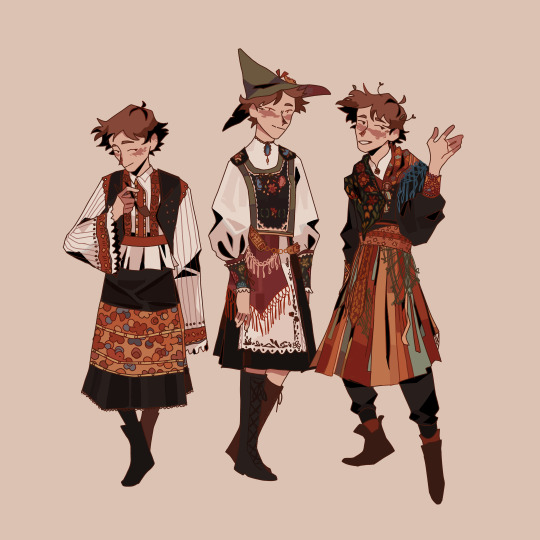
Snufkin in different traditional outfits!! :O
#from left to right :#hungarian traditional clothing#german traditional clothing#czech traditional clothing#Theyre all so impressive :.)#i love drawing these types of dresses and outfits genuinely!! Wow!! So much to learn…#Snufkin#moomins#the moomins
954 notes
·
View notes
Text
Using my powers (A2 level czech) for evil (eavesdropping on Czechs at the beach in Croatia)
492 notes
·
View notes
Text
First lecture of czech language intricacies:
Quote: Posrala se mi lednička
Translation: My fridge shit herself
Meaning: My fridge stopped working
#i am not using shat since we are modern people here#czech#czech republic#czech language#language#vocabulary#learning languages
65 notes
·
View notes
Text
kde - kam - odkud?
prepositions of place (where? - to where? - from where?)
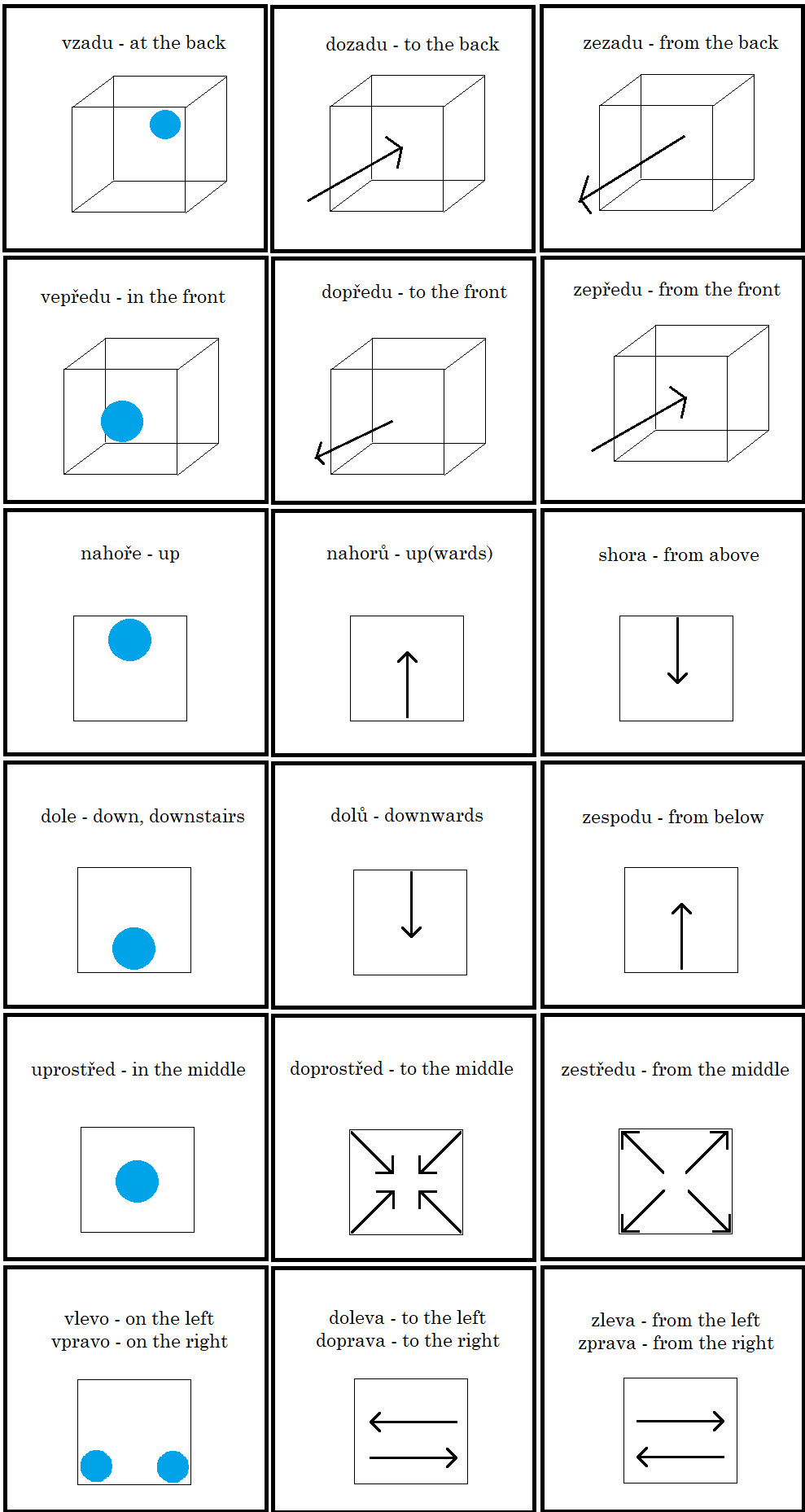
#czech#czech language#learn czech#learning czech#languages#language learning#langblr#langblr post#czech langblr#czech blog#made by yours truly#on paint#thanks paint
73 notes
·
View notes
Text
Ok since Tomas is from the Czech Republic and his first language is probably Czech, I headcanon that he sleep talks in the language unknowingly. I imagine both of his brothers get jumpscared in the middle of the night to hear random unknown words in their home, only to discover it’s just Tomas sleeptalking again.
#tomas vrbada#smoke mk#smoke mk1#mortal kombat#mortal kombat 1#the reason I thought of this is because I have a coworker who’s Czech and he does this#hes fluent in English but since he learned Czech first he just- sleeptalks in it#idk why but it’s Funny To Me
73 notes
·
View notes
Text
Greetings! [Lesson #1]
Hello! Welcome to your first Czech lesson! I am really happy, that you decided to learn Czech. In this lesson, you’ll learn, how to greet people and few other very useful phrases! Let’s get started!
Hello and Goodbye
In Czech, we differentiate between formal and informal speech. Usually, when the person is older or a stranger, you use formal speech. If you’re talking to a child or a person you know closelly, you’ll use informal speech.
Formal Greetings
Dobrý den - Hello (literally good day)
You can use this greeting universally during the whole day. There is no wrong and no right time of the day to use this word.
Dobré ráno - Good morning
Unlike in English, in Czech we usually greet each other with good morning after waking up and during the breakfast. Morning is usually considered the time up to 10 am.
Dobré odpoledne - Good afternoon.
Dobrý večer - Good evening
Dobrou noc - Good night
Na shledanou - Goodbye
Informal Greetings
Even though I have sorted the greetings dobré ráno, dobré odpoledne, dobrý večer and dobrou noc as formal, they can be used between friends too.
Ahoj - Hi/Bye
Čau - Hey/Bye
Both čau and ahoj can be used as well when you are meeting someone as when you are parting your ways.
Asking and replying to “How are you?”
Again, because of the formalities, there are two ways of asking this question in Czech.
Formally: Jak se máte?
Informally: Jak se máš?
Can you see how the last word changed? Depending on the formality of the situation we conjugated the verb differently. However let’s not worry about it for now, you’ll learn how to do that in the next lessons!
Fortunately, you can reply in the same way to both of these questons.
Mám se dobře - I’m fine/good.
Mám se špatně - I’m unwell.
Ujde to - Neither good nor bad.
So that’s it for today’s lesson!
Continue to Lesson #2 or practice your vocabulary of this lesson on Memrise.
2 notes
·
View notes
Text
"BOO!" in different languages.
Thanks Duolingo 🦉

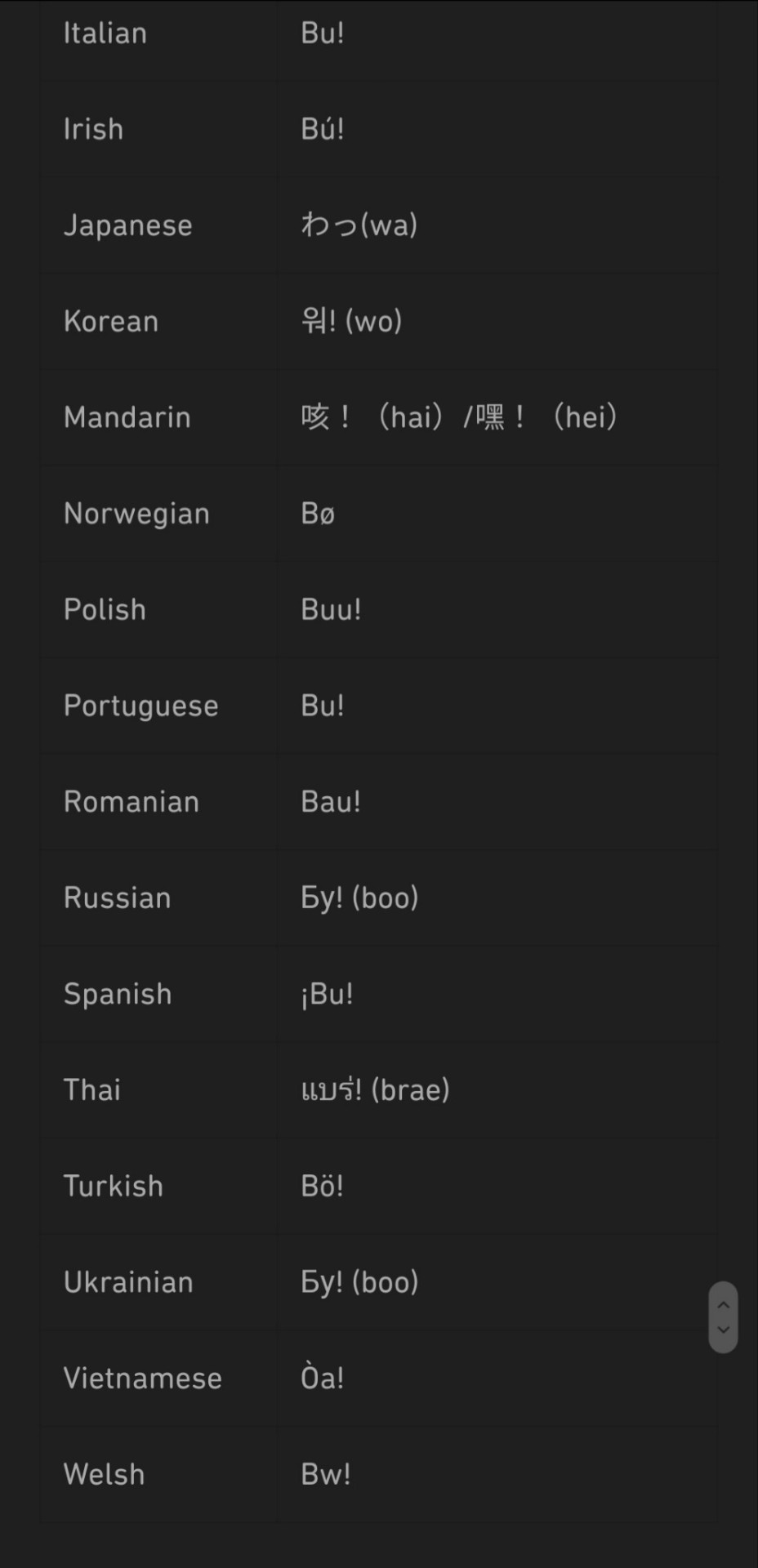
#language#language learning#korean#learning korean#italian#learning italian#greek#japanese#learning japanese#russian#welsh#irish#thai#chinese#mandarin#dutch#french#spanish#german#czech republic#polish
64 notes
·
View notes
Note
Radek said fuck in show?
Yup. It's in Czech 🇨🇿 but imo it counts.
"Do prdele" it's an equivalent for "Shit" or "Fuck." He says it to John in the submersible jumper (Grace Under Pressure) and to Evan on the Daedalus. (No Man's Land.)
He says "Já se už na to můžu vysrat," to Rodney when he's in the chair being a dick. Basically he's saying "Fuck it" or "Fuck this." e.g. Rodney is being an ass so fuck this. (Tao of Rodney.)
I think that's all of them. Hopefully my Czech is still on point for these translations @all-mighty-yaoiyuri is the Czech who checks my Czech.
It's been awhile though! 💛💚
#my czech language learning went to hell when my nephew died#SIIIIIIIIIGH#i miss it#but no spoons for it rn#still obsessed with Czechia though#y'all should go - beautiful country and the people are so nice!! some people say they are “cold” but I didn't experience that at all#also if you do go! learn some czech (do it anyway) - you should have seen the surprised looks and grins I got over there#cold? bah! yeah right#sga#stargate atlantis#radek zelenka#john sheppard#rodney mckay#evan lorne#grace under pressure#no mans land#tao of rodney#czech#česky#🇨🇿💚💛🦊#cussing#anon
56 notes
·
View notes
Text
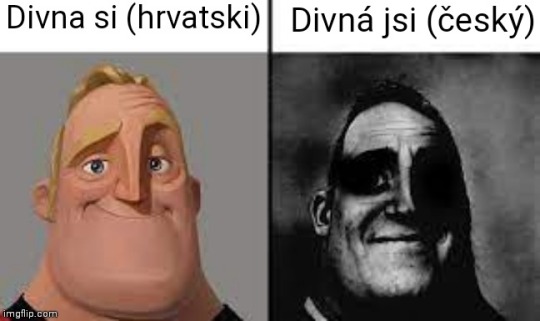
Fuck the Tower of Babel, whoever was in charge of creating czech and croatian words did some messed up shit.
1K notes
·
View notes